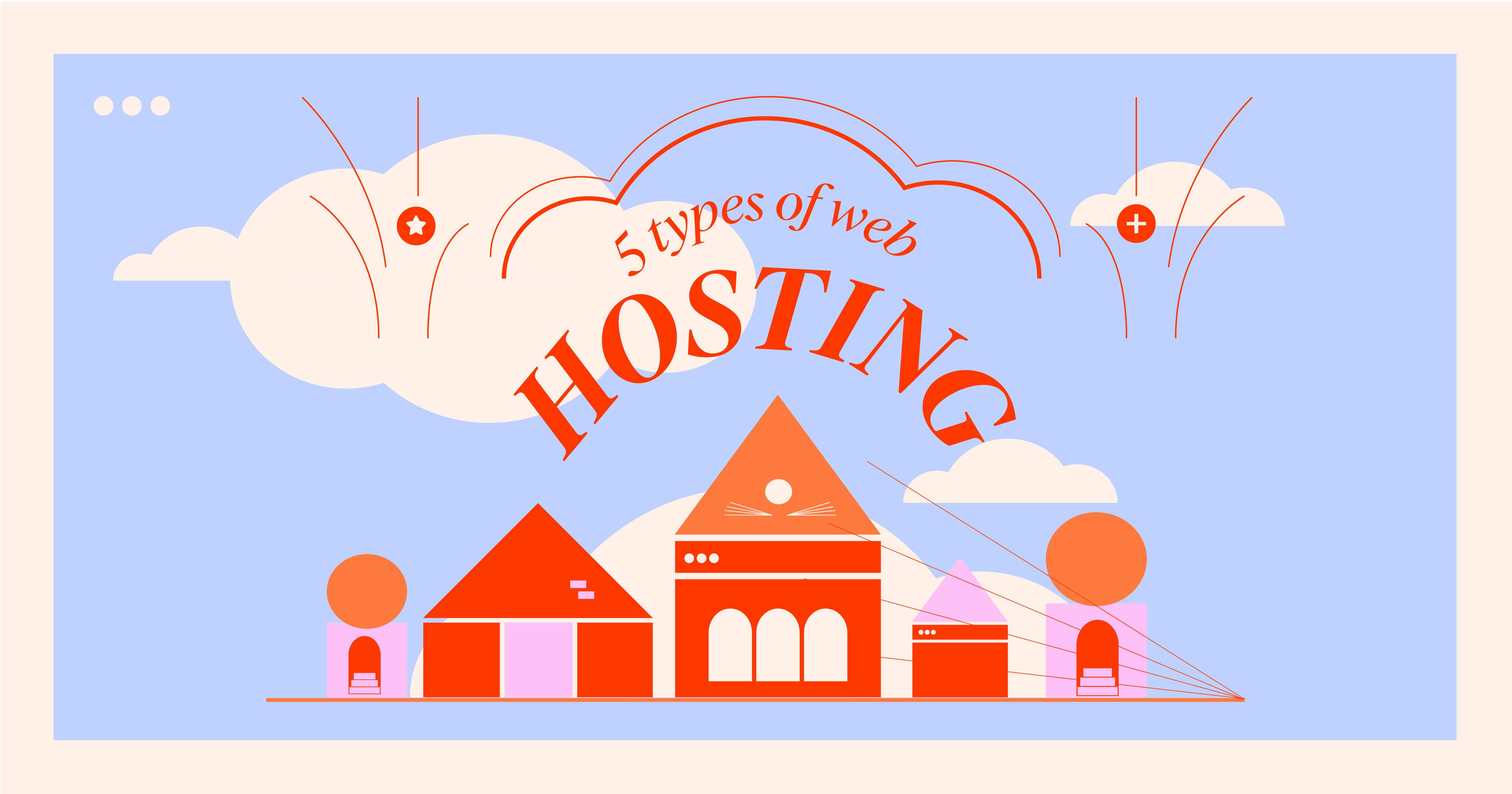Table of Contents
If you’re looking to make a WordPress website, you’re going to need website hosting.
Once you start researching your options, you’ll quickly discover that there are different types of hosting, each with different prices, performance, features, and technical complexities.
If you want to make the right decision for your website, it’s important to know what each hosting type is, along with its associated pros and cons.
That’s what this post is for. We’ll start with a general explanation of what website hosting is. Then, we’ll break down the most popular types of hosting and help you understand which one is right for your website.
Read more about the hidden costs of website hosting
What Is Website Hosting?
Website hosting is the hardware that powers your website and makes it available to visitors around the world.
In other words, it’s where you store your website’s files and content and it’s also what serves those files to visitors when they access your site (by typing in your site’s domain name).
Every single website has some type of web hosting behind it, whether it’s a big website like YouTube or your friend’s knitting blog.
When you purchase web hosting, you’re essentially renting space on a computer. This could be part of a computer that you share with other people, an entire computer, or even space on a network of computers (AKA “the cloud“).
Once you have your website hosting, you can start putting it to use.
Just like you can install the software (e.g. apps) on your personal computer, you can also install software on your web hosting.
For example, creating a WordPress website requires two basic foundations: web hosting (the hardware) and WordPress (the software). Once you have these two set up, you can start designing your site with tools like Elementor. However, if you’re feeling overwhelmed by the technical aspects of managing your own web hosting, you can choose an all-in-one managed WordPress host like Elementor Hosting. It provides award-winning support and takes care of security, software updates, performance, and backups, so you can focus on designing and creating your site.
Different websites will have different hosting needs when it comes to the resources that are needed to power the website.
A high-traffic, high-resource website will need hosting with a lot of power to handle the workload, while a low-traffic site will be fine with less power.
In general, more powerful hosting will cost more money. You wouldn’t expect a cheap $300 laptop to perform as well as a $10,000 top-of-the-line computer, and it’s the same for web hosting.
The Five Main Types of Web Hosting
Now that you know what web hosting is, let’s go through the five main types of website hosting.
All of these hosting types are fully capable of powering WordPress sites. However, some may be more suited to your WordPress site’s unique situation than others.
1. Shared Hosting
With shared hosting, your account and websites will share resources with other hosting accounts on that server.
Really the only reason to choose shared hosting is the price. Because accounts share resources, shared hosting is typically the cheapest way of hosting a website.
Most shared hosting providers also advertise generous limits such as “unlimited websites” and “unlimited storage” (though there’s no such thing as truly “unlimited” hosting).
However, from a performance perspective, sharing resources with other accounts is not an optimal configuration. How well shared hosting performs really depends on how many hosting accounts the provider tries to put on each server.
2. VPS hosting
A Virtual Private Server (VPS) web hosting plan combines dedicated and shared web hosting features. The website content is hosted within virtually-partitioned sections on the web server to mimic a dedicated server while still sharing the server among multiple users.
VPS hosting provides businesses and website owners the ability to customize their storage resources on the web server without necessarily needing a dedicated server.
Advantages
- Provides features of dedicated hosting but at a lower cost
- Higher uptimes and speeds than shared web hosting
Disadvantages
- Cannot handle high traffic due to resource sharing
- Only a few aspects of the server can be controlled
3. Dedicated Hosting
With dedicated hosting, you have an entire physical server just for your site(s). You get everything and you don’t need to share it with anyone else.
The main advantage of dedicated hosting is that you have full control over the physical environment. You can choose the hardware, the software, and so on.
However, the vast majority of WordPress users do not need dedicated hosting. This is mainly a solution for large enterprise businesses that need a dedicated hardware environment for specific technical or regulatory reasons.
For most WordPress users, you can get the performance benefits of dedicated resources by using cloud hosting, at a lower price than dedicated hosting.
Dedicated hosting is something that you’ll come across, which is why it’s worth mentioning. But for a quick-loading website, Managed WordPress hosting offers better value.

4. Managed WordPress Hosting
Managed WordPress hosting is a type of hosting service specifically designed for websites built with WordPress. Unlike traditional hosting, managed WordPress hosting provides a more optimized and secure environment for hosting WordPress websites.
The hosting provider takes care of the technical aspects of running and maintaining the website, such as software updates, security, backups, and performance optimization. This allows website owners to focus on creating and publishing content, without having to worry about the underlying technical infrastructure.
The defining feature of managed WordPress hosting is that they offer a suite of “concierge” features for WordPress users that go beyond what generic hosting offers. This includes features such as the following:
- Automatic backups
- Staging
- Automatic WordPress updates
- Built-in performance optimizations.
- WordPress-specific security features
- Expert WordPress support
5. Colocation Hosting
Colocation hosting is an advanced type of hosting that’s really only used by large businesses.
With colocation hosting, you physically own the hosting hardware. That is, you’ll actually purchase the hosting servers that you want to use. However, you rent space in another company’s data center to have that company power and maintain that hardware for you.
Basically, you get to keep using your own infrastructure but you eliminate the need to have your own physical space for that infrastructure (along with all of the associated costs such as electricity and air conditioning).
Again, this is not something a WordPress user will ever need, but it is a type of hosting that you might see, so it’s helpful to know this term.
Elementor’s Managed WordPress Hosting
As you can see, there’s a good deal of complexity when it comes to the different types of hosting.
If you don’t want to deal with choosing between all of these options and you’d rather just focus on building and growing your website, you might prefer to use Elementor Hosting.
Elementor Hosting takes the headache out of choosing hosting infrastructure by giving you a complete platform to build a website using WordPress and Elementor. Instead of messing around with technical details, all you do is sign up and start building your site using the pre-installed tools.
Elementor Hosting offers an all-in-one managed WordPress hosting solution for an affordable price with no other cost surprises.
With hosting plans starting from just $9.99/mo for the first year, you’ll get the following:
- Managed WordPress Hosting powered by Google Cloud Platform
- WordPress and Elementor Pro pre-installed
- Fast & Secure CDN by Cloudflare
- Free SSL certificate and DDoS protection
- Plenty of storage, bandwidth and monthly visit options
- Free custom domain connection
- Free Elementor Domain
- Automatic daily backups
- On-demand backup
- Top support for both Hosting and Elementor
You get all Elementor Pro widgets, features and templates out of the box, in a hassle free hosting platform, optimized especially for Elementor builder. Remember – it’s an all-in-one solution for building websites!
Conclusion
If you want to make a website, you need website hosting. However, there are different types of hosting that you can choose from, so it’s important to understand your options, along with the pros and cons of each type of hosting.
For example, some hosting types focus on keeping costs low at the expense of performance, while others focus on offering maximum performance and flexibility (but often at the expense of higher costs or added complexity).
For those looking for a simpler user-friendly way to get started, Elementor Hosting is a great choice to get your site up and running quickly without any technical headaches. You’ll have peace of mind knowing that everything is managed for you, including robust security, automatic software updates, and regular backups. Additionally, your site will load quickly providing a great experience for your visitors.
Instead of worrying about technical details and which type of hosting is best, you can focus on building websites right away using Elementor’s all-in-one platform.
Do you still have any questions about the different types of hosting and which one is right for your website(s)? Let us know in the comments!
Looking for fresh content?
By entering your email, you agree to receive Elementor emails, including marketing emails,
and agree to our Terms & Conditions and Privacy Policy.






